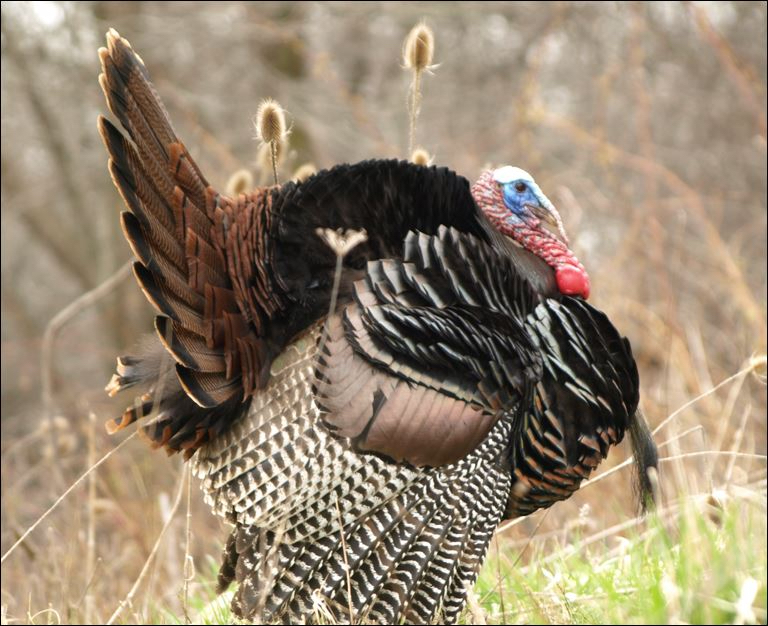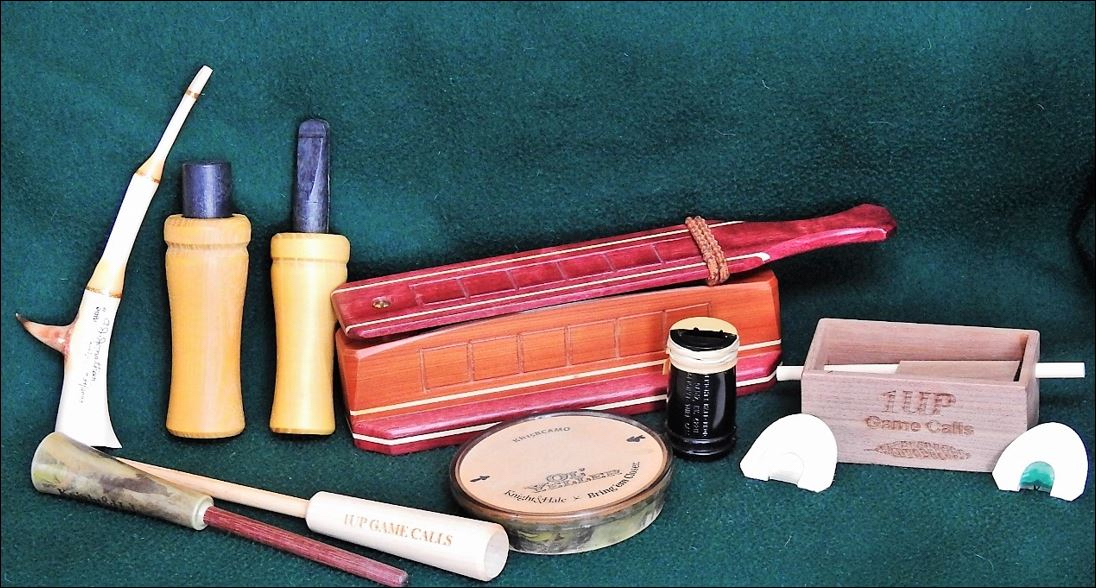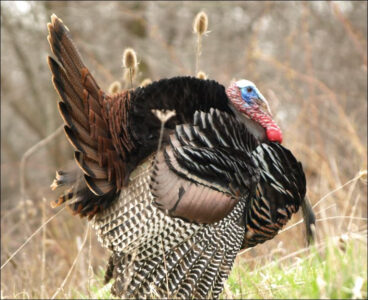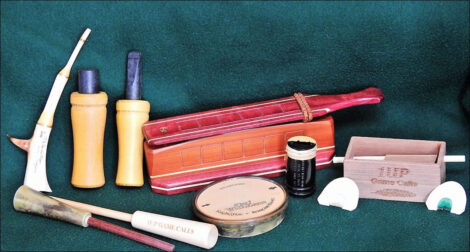Last day for turkey hunting
- Photo courtesy of the late Joe Forma Collection Wild turkeys like to seek cover on rainy days, but when the rain lets up, they head straight for the nearest open field to find worms, grubs and other turkey friends. The deer are often with them. Hunting on a rainy day is not always a bad idea.
- Photo courtesy of James Monteleone Turkey calls come in many sizes and shapes, but they are designed more for spring turkey hunting. Fall turkey hunting is more about being in the right place at the right time, in a travel corridor, when the rain lets up.

Photo courtesy of the late Joe Forma Collection Wild turkeys like to seek cover on rainy days, but when the rain lets up, they head straight for the nearest open field to find worms, grubs and other turkey friends. The deer are often with them. Hunting on a rainy day is not always a bad idea.
Late October turkey hunting in Western New York can be fun, a lot of luck is involved, but the turkey and the deer tend to hang around together, so hunting for deer or turkey can be a joint effort.
The last day of the autumn Southern Zone season is today, sunrise to sunset, with a daily bag limit of one bird, either sex. When heavy rain is forecast, like today, turkeys behave differently. That doesn’t mean success is off the table, it just requires adapting tactics. The best strategies for harvesting a fall turkey in Chautauqua County when rain is expected can also apply to deer for the rest of the early archery season.
In steady rain, turkeys tend to leave thick woods (where dripping branches make noise and visibility is low) and move into open areas like hayfields, pastures and logging roads. These areas let them see predators more easily and shake off water. Wear a rain slicker, of course, and a long-brim hat, and try glassing from field edges or a ridge overlooking an opening where flocks might feed on leftover grains or insects. The edges of conifer stands or inside old apple orchards provide natural cover from rain while still near feeding zones, where you can set up.
If hunting from a ground blind, this is your time, because blinds keep you dry, quiet, and in place longer. Turkeys won’t mind the blind as long as it’s set before daylight. Turkeys are most active during breaks in the rain, especially right after a storm front passes.
Birds often feed aggressively after waiting out a downpour during the lull that follows; deer walk then too. Rain muffles sound, so calls need to be louder and less frequent. Box calls and aluminum pot calls cut through the damp air better than mouth calls. In steady rain, it might be best not to call often, turkeys rely more on sight than sound in rainy conditions.

Photo courtesy of James Monteleone Turkey calls come in many sizes and shapes, but they are designed more for spring turkey hunting. Fall turkey hunting is more about being in the right place at the right time, in a travel corridor, when the rain lets up.
Fall flocks in Chautauqua’s hardwood ridges and agricultural zones tend to roost in pines and move downhill to feed after sunrise. On rainy mornings, they may roost longer, so plan to stay patient near known roosting areas. Staying out longer boosts your odds, but dress for comfort, stay dry. Use quiet rain gear, waterproof boots, and seat cushions to stay comfortable and stealthy. Turkeys have sharp eyesight, so avoid shiny fabrics that glisten in wet light. If the rain is truly pounding, turkeys often hunker down and wait it out. That’s a good time to take a break, watch from a truck or covered blind, and return as the rain lightens, that’s when action often picks up quickly afterward. Lots of areas to hunt on a wet weather day, Watts Flats Wildlife Management Area (Town of Harmony) is a 1,401-acre WMA in Chautauqua County comprising significant marsh, brush and wetland edges. Turkeys (and deer too) tend to utilize edges of swamp/brush and transition into adjacent woodlots when conditions get wet. On rainy days, birds (and deer) often move along travel corridors between thick cover (where they tried to stay sheltered) and feeding zones. In a wet WMA like Watts Flats, those edges become dynamic and are the best places to find hunting opportunities for success.
CALENDAR
Oct. 31: Last day of NYS Southern Zone turkey season.
Nov. 1: Leftover Deer Permits go on sale; check dec.ny.gov for details.
Nov. 4: Niagara Musky Association, monthly meeting, 7 p.m., Eldridge Club, 17 Board St., Tonawanda.
Nov. 4: Children in the Stream, Youth Fly Fishing program, free, Costello Room, Rockefeller Art Center, SUNY Fredonia, 7-8:30 p.m., 12 years old and older, info: 716-410-7003 (Alberto Rey).
Nov. 8-9: NYS Western Zone waterfowl hunting, military days, see syllabus for bag limits/rules.






